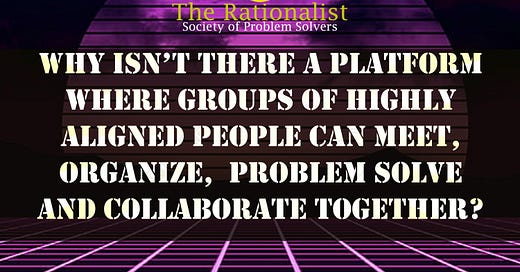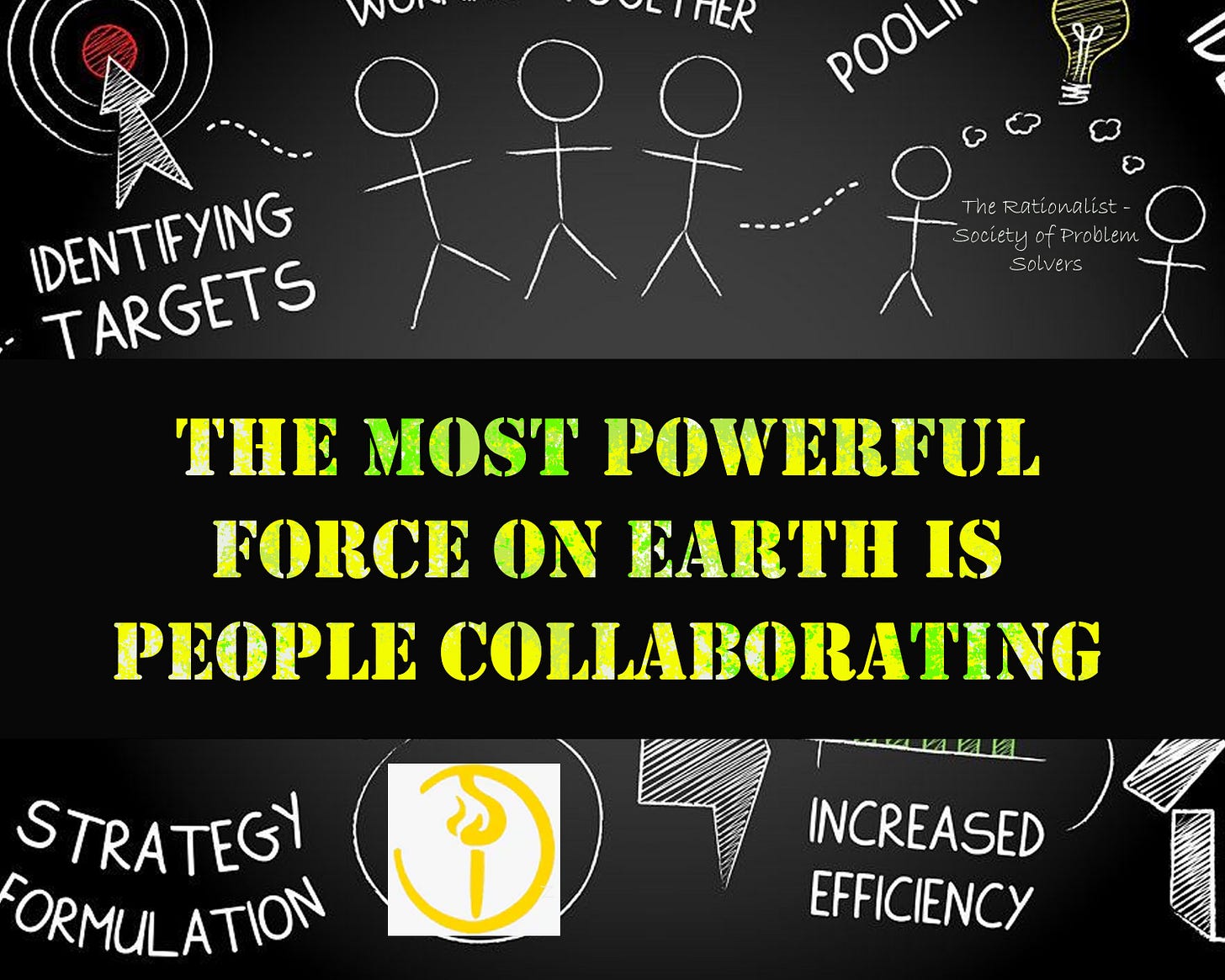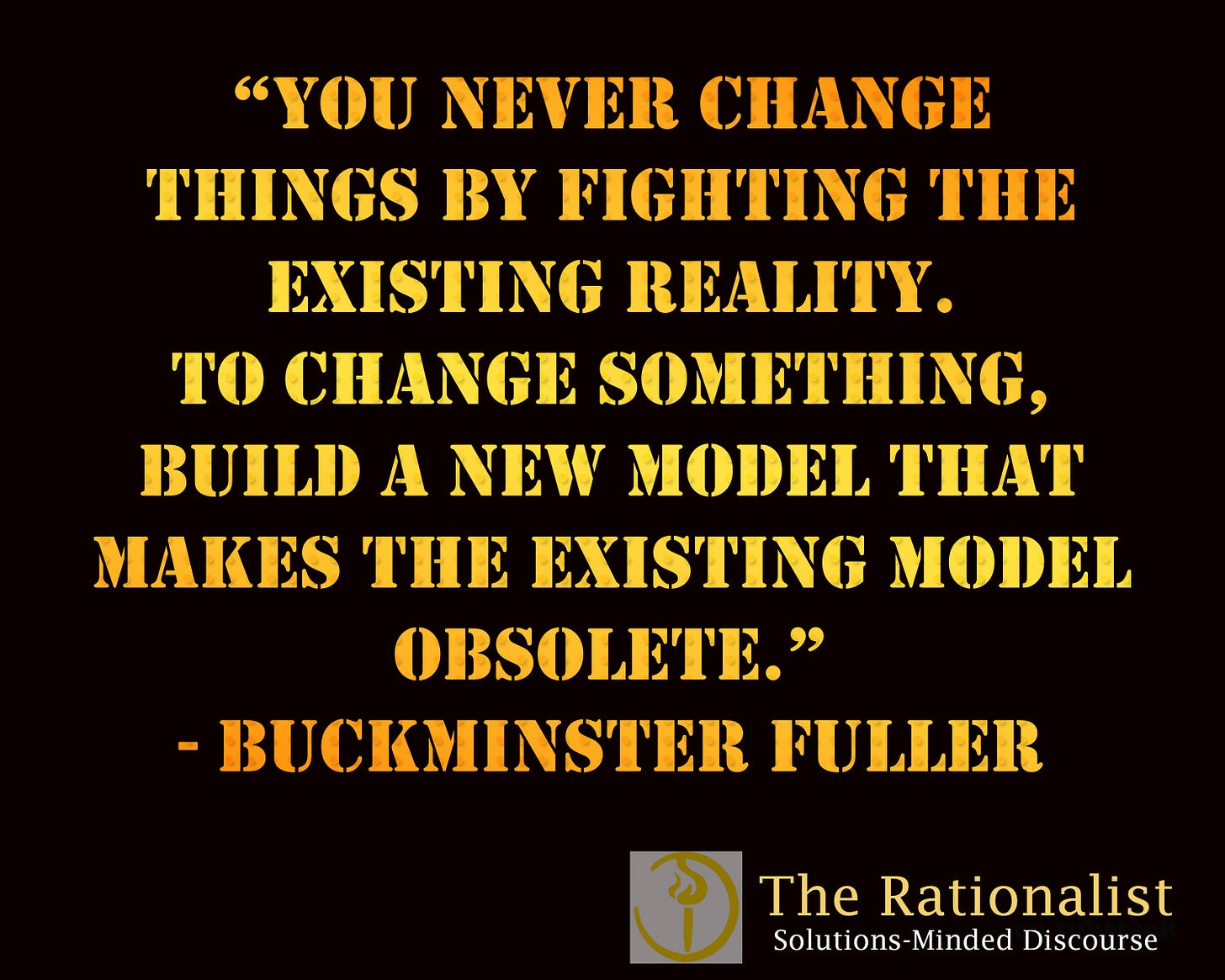Why Doesn't This Exist? A Platform for Human "Super Collaboration" (part 1).
So you want to start a movement? Change things? We do too. So why don't we have the tools to do just that?
After listening to Balaji Srinivasan’s epic eight hour podcast with Lex Fridman, Balaji gave his take on so many important topics such as his Network State idea (which he wrote a book about HERE), his views on decentralizing the FDA (and all of medicine and all of science), his brilliant take on having decentralized fact checkers for social media, and even his raw views on the dangers of communism (it is centralized, therefore dangerous). This podcast was one mind blowing topic after another. We can see why Lex let the tape roll so long (listen to full podcast here).
When Balaji finished describing his ideas for a decentralized world, it hit us: We want to be part of THAT: A decentralization and transparency movement toward building network states. But there was one big problem: there was nowhere easy for us to go. We tried his website and Twitter, but didn’t really see a great way to communicate with him.
A big part of what Balaji was explaining with his Network State idea was how to get groups of highly aligned people working together heading in the same direction. But the irony of it all is that we couldn’t find a simple way to even connect with him - let alone align with him on a mission.
The same thing is true with Tim Urban’s new book “What’s Our Problem?” In it (read more here) he describes “idea labs” as places to meet up, solve problems, connect imaginations and more. But where are these idea labs? We wanted to create a digital idea lab with him and his collogues. We tried to connect but failed.
Crickets.
There had to be a better way. We started thinking - why isn’t there a platform where groups of highly-aligned people can meet, organize, problem solve and collaborate together?
For us at the Society of Problem Solvers, this would be our dream platform.
If we had a digital place for decentralized groups to organize their objectives better, imagine the potential for humanity. It could create opportunities like we have never seen before.
Before we imagine this new possible system, let’s review something we talked about in a previous article: There are several ingredients needed to make decentralized but highly aligned systems work optimally together. Those are trust, and the right tools.
1) Trust - the easiest way to make a system trustworthy is to make it transparent so all nodes can inspect it at all times. Another excellent way to build trust in a system is with a good blockchain ledger (like what Bitcoin uses). There are also very reliable peer-to-peer “trust” rating systems like what Etsy, eBay or Amazon uses for sellers and buyers (yes we know that these companies are all centralized entities, but they harness the power of decentralization with these peer-to-peer systems). In reality, trust is a sliding scale. Think about how trustworthy some of the closest people are in your life. They don’t all rate in the same level of trust. The digital space should be no different. We should attempt to measure trust as accurately as possible. We will brainstorm this problem of trust with you in part 2 of this article, coming soon. But for now, think of it like an ELO score in chess.
2) Tools - Today, that means technology. Namely, a user-friendly open-sourced platform that helps groups of highly aligned people (sometimes strangers) organize and execute missions together. A platform that could be used by decentralized groups to help organize and collaborate across all different spectrums of humanity. This tool is the focal point of this article, part 1.
To understand the value of a platform like this it might be easier if we give the idea some substance.
So let’s imagine this platform already exists. We’ll call it, say, “Super Collaborators” since we own that website and would happily turn it over to a decentralized open-sourced community (for real, we would) interested in creating this platform.
Imagine having your own profile page on SuperCollaborators similar to most social media platforms. You can have a real name, or pseudonym. Avatar or photo. And you enter into this society of collaborators. Maybe you carry with you a crypto wallet and whatever other information you choose to share, just like any other social media platform.
The meat and potatoes of the platform would be the missions.
Once you have a profile made you could browse a feed of “missions” to join. Imagine scrolling randomly to see what kind of cool missions people have started. Or maybe searching by keywords of things that interest you. Once you find a mission, you apply to join it. The creators of the mission (or some kind of voting body they establish) decides if you qualify as “highly aligned” with them before allowing you to join their mission, and that might be decided by a variety of ways. Each mission could have different requirements to join, a different process needed to apply, and different parameters and rules with how it is run.
That’s the beauty of it. We would get to test a bunch of system iterations out and see which ones work best. Then repeat those.
Once you’re accepted into a mission you become an “ally” of that mission. These missions could accomplish goals - often tangible ones in the real world, but it could also be virtual ones as well. There are so many directions an idea like this could go in.
Imagine scrolling through local or national or even international “missions.” Missions could be serious or could be fun or could be both. Envision working on and completing missions with some of your favorite people from all over Earth. Does your neighborhood park need a new facelift? Do you want to get the fluoride out of the water in your state? Do you want to create a decentralized on-chain token that people give to each other in exchange for acts of trust? Do you want to create a new system of governing called “iGov” that uses the power found in direct democracy to eliminate corruption in government and bring people together across party lines? (More on this soon). Well here is your chance!
Start a mission on SuperCollaborators. Set some specific parameters and requirements for joining your mission. Gain allies. Use different “rooms” or tools to further your mission. Brainstorm in a “think tank” room with other people on the same mission. Come up with ideas. Video discuss, or chat, or give presentations. Upvote the best ideas and record votes on-ledger. Discuss the dangers of bad ideas. Give out voting rights within the mission based on a variety of changeable parameters. Make action plans. Define goals. Set monetary $ bounties for accomplishing or attempting to accomplish tasks on the mission. Earn more trust with the people you collaborate with. There are so many possibilities.
A system like this could be used to organize groups of volunteers, or groups of workers for-profit. The missions could also have ways to raise money for missions such as DAOs, tokens, or other fund raising outlets.
Also an idea to ponder - every “main mission” could have an endless number of smaller “side-missions” that need to be completed as well. Completing a side mission might be a way to show trust and value to the group in order to be let into the group in the first place, sort of like an initiation. Want to be part of this mission? Well do something of value for the mission first; show your trustworthiness.
For example, right now we could’ve found Balaji Srinivasan on the SuperCollaborator platform to see if he had started any missions, and if there was any way we could join in to help brainstorm, execute, or implement any parts of them. The other people on the mission with us could look at our wallets and profiles and already have a general gauge for our level of trustworthiness and participation on the platform. This could all be organized in one dynamic but easy-to-use system.
Most social media platforms are just about different levels of discourse. This one would use technology to create tangible action plans, and help people who want to highly align with others by providing them with the tools to do so.
Imagine being free to join (or leave) any mission at any time (as long as the mission would accept you). Imagine browsing these missions for ones you would like to join (we call it “mission fishing”).
Imagine creating your own mission and trying to find allies to join yours, and setting your own parameters, requirements, mission statements, rules, voting structure, fund raising options, tool boxes, and code of conduct for the mission.
Each mission could have its own parameters as set by the person or people who create the mission. These parameters could also evolve as the mission went on. Maybe the mission is a dictatorship and 100% of the voting rights and parameters goes to the person who created it. Or maybe the mission has voting rights spread out based on a variety of factors - from trustworthiness, to seniority on the mission, to whoever contributes money or raises money for the mission. The possibilities are endless.
At The Rationalist we always talk about the power of decentralized systems. But the most powerful system on Earth is really a decentralized system that is highly organized and aligned. To form this type of organization we need the right tools - something like what we are describing.
In order to maintain trust - which is essential for decentralized systems to run optimally - this system must be built transparently, and open sourced.
It would make sense to us if all missions on the platform had one clear mission statement. This way people browsing missions could easily see if they align with it. For example, imagine there was one mission on Super Collaborators right now - mission number 1 - and it read:
”To create and promote a constantly evolving platform for human super collaboration that works to optimize the synergy of people while always defending itself against corruption.”
If you read that and it felt like something you wanted to stand for then you could simply apply to join the mission, and wait to see if you were accepted. Once accepted, the people on the mission would help discuss with you where your skills and efforts would be best used. Maybe that is just as simple as liking and sharing posts and hastags for the mission. Or, maybe it is something that has a $1 million bounty for completing. Again…. the possibilities!
But here is the BIG question: How do we get from here to there? What is that next step?
As Balaji says, the first step is getting 1000 people highly aligned. That means 1000 people sharing the same thing. So if this aligns with you, please do so and share.
Nearly all of the systems in our world have become corrupted from centralized power. We have the knowledge to fix it. The kryptonite to their collusion is our super collaboration, using transparency and decentralization as our main shields against their corruption.
Thanks for reading.
As always the entire purpose of The Rationalist is to connect with other solutions-minded people like yourself! We strive to be a Society of Problem Solvers, and if you align with that we are happy that you’ve joined us. For over 3 billion years on this planet there were only single-celled organisms. Then one day they somehow learned to work together and make complex multi-celled creatures like you and me. Right now we are like those single-celled organisms. Our next evolution is finding how to work together, better.
#DecentralizeEverything #Transparency #transparentsystems
COMMENTS ARE FOR EVERYONE AS A PLACE TO THINK-TANK SOLUTIONS. They will never be for paid-only subscribers and we will never charge a subscription.









I love this idea! I’m not tech savvy but problem solving is my superpower. I think this is a great way to transform what’s happening. El Gato Malo talks a lot about open sourcing science etc too - I think it’s a direction/idea whose time has come.
I love it! It is time we use technology for good, again.
I cringed at GoFundMe - small detail but geez, they can go F themselves ;) I tried to donate to Canadian truckers (as a US citizen last Winter) and money was automatically returned to me. Scary stuff. Punchline is: Money part needs to be handled very thoughtfully.